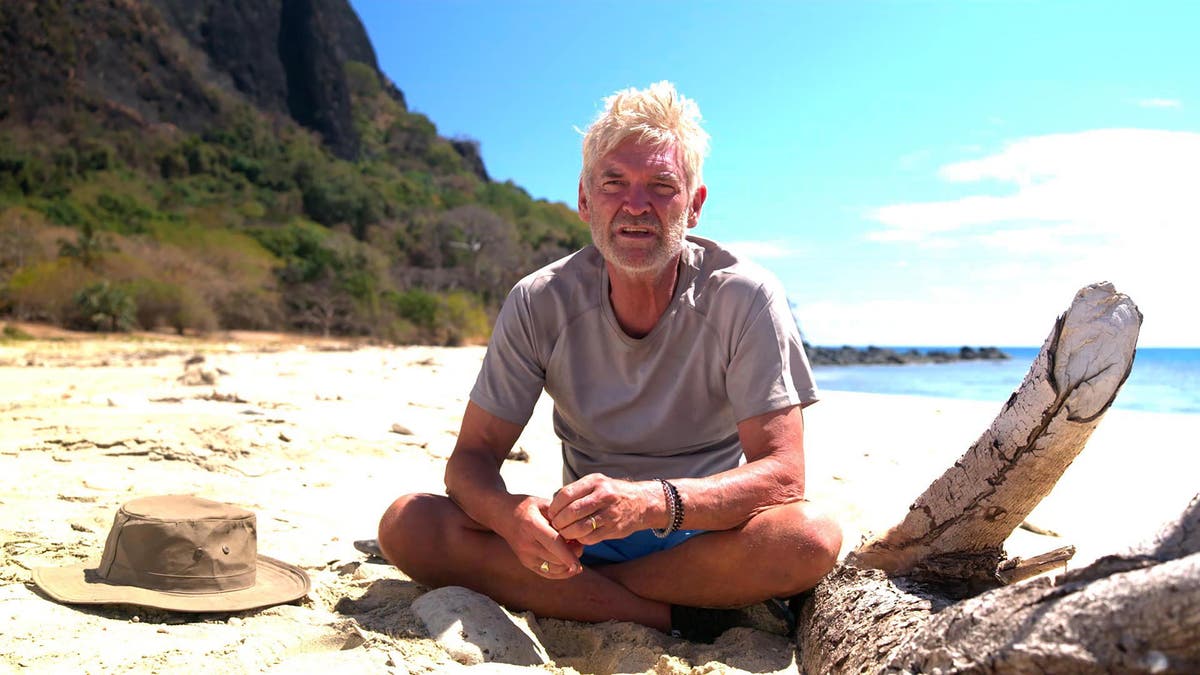An unkempt man in a T-shirt and shorts wanders across a paradise beach. He has a go at chopping up some fruit with a big knife, then settles down in front of a campfire, musing: “I know what I did was unwise… but is it enough to absolutely destroy someone?”
This is the newly released trailer for Channel 5’s Cast Away, in which our intrepid hero Phillip Schofield is left alone with some camera equipment for 10 days of soul-searching on an island in the Indian Ocean.
The reality TV show’s supposed purpose is to see if the 62-year-old fallen star can survive with “no food, no water, no crew”, as he posted on social media. But, perhaps more pertinently, it gives him a public forum in which to muse on his tremendous plummet from TV fame 18 months earlier, when he was revealed to have had an affair with a much younger man who worked with him on This Morning, and, in a tearful interview, announced that he was gay – before resigning from ITV.
Schofield committed no crime. But, as he said himself, his relationship with a junior colleague some 30 years younger was “unwise, but not illegal”. He then went on to do a series of high-profile interviews, including a prime-time chat on BBC One with Amol Rajan, in which he was clearly distressed, apologetic, and keen to put his side of the story. He said that without his family by his side, he may have taken his own life.
Schofield has been quiet ever since, but the Instagram announcement of his return to television has thrust him very much back into public scrutiny. And I cannot help myself sounding like Dad’s Army’s Sergeant Wilson by uttering the words: “Do you think that’s wise, sir?”
While it’s natural to want your side of the story out there, I feel that Cast Away may constitute an act of public self-harm.
The programme’s commissioning editor, Guy Davies, says: “The audience will learn how he feels now about television and the future, as well as the past”; it’s the T-word there I find difficult.
Schofield has been a presenter since he was a teenager, and success on the small screen is all that he’s ever known. His glittering world of honey-blonde co-hosts, celebrity guests and the smart lifestyle that comes with being a household name must be incredibly hard to have to let go – but being on television is not a right.
The world of TV is incredibly fickle, loving some stars to bits and putting them on every conceivable show at one point, then deciding they’ve overstayed their welcome and quietly putting them out to grass. It’s the nature of the beast, especially now, when influencers without Schofield’s years of experience are snapped up to front their own shows.
Comedian Michael Barrymore experienced a similar public backlash in 2001, after the body of meat-factory worker Stuart Lubbock was found floating in a pool at his Essex home, in suspicious circumstances. The criminal case has never been solved, and Barrymore has always denied involvement in Lubbock’s death.
Like Schofield, the Strike It Lucky star had revealed he was gay at the height of his on-screen popularity, and after years of marriage to a woman. Having failed to resurrect his career after the scandal, Barrymore eventually emigrated to New Zealand, realising that there’s no point in banging your head against a wall.
Schofield might have done better to follow Barrymore into pub-quiz obscurity – or, better still, to have taken his lead from John Profumo.
In the early 1960s, the secretary of state for war in Harold Macmillan’s Conservative administration had an extramarital affair with a teenage society girl, Christine Keeler (who was also involved with Yevgeny Ivanov, a Russian naval attaché). What became the first political sex scandal of the modern era helped bring down the government.
Profumo had to resign – but, rather than carefully plot his cabinet comeback with well-timed photo opportunities and the occasional appearance on Call My Bluff, he spent the rest of his life quietly devoted to working for the underprivileged in the East End.
No one in the public eye, no matter how great the scrutiny of their flawed personal lives, is automatically entitled to redemption – and the television industry can be more unforgiving than most. But Schofield’s raking over of things better forgotten while marooned on Madagascar, an early step on his redemptive journey back to primetime, may turn out to be a hiding to nowhere.

